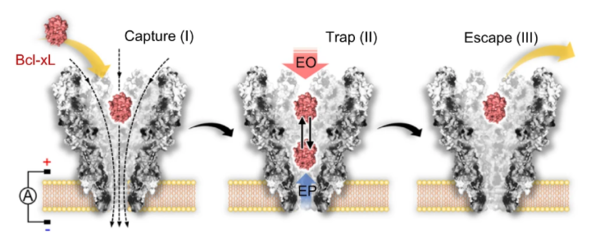Researchers at the Korea Research Institute of Bioscience and Biotechnology (KRIBB) have developed a novel nanopore sensor that efficiently screens protein-drug interactions, enabling faster drug discovery while minimizing associated costs.

Candidate discovery analyzes the binding between target disease proteins and drugs, but analytical technologies developed to date require expensive equipment or the combination of average signals measured from multiple molecules. Consequently, this results in low sensitivity, large sample volumes, and low solubility of some target proteins and drugs, making them very difficult to access for drug development.
Nanopore sensors can electrically measure the flow of ions through a hole several nanometers wide and can analyze its characteristics when it passes through the nanopore. However, existing nanopore sensors cannot easily measure proteins of various sizes and charges, and have limited sensitivity to distinguish whether proteins are bound to drugs.
Accordingly, the research team developed a highly efficient nanopore sensor for drug discovery that can analyze target protein-drug binding even at the single-molecule level.
Using protein engineering technology, the research team designed a funnel structure to capture only one target protein with a nanometer-sized hole,
By utilizing the phenomenon of electro-osmosis, various target proteins can be measured individually significantly reducing the sample volume, time, and cost of preparing target protein and drug samples compared to nuclear magnetic resonance (NMR) spectroscopy.
Additionally, the researchers also developed a drug fingerprinting technology that can distinguish between different small molecule drugs bound to the same target protein and accurately identify drugs’ mechanism of action.
In particular, it can accurately analyze protein-protein interactions in a single molecule and the efficacy of drugs that inhibit protein-protein interactions.
"We have succeeded in developing a nanopore sensor with ultra-high sensitivity that can measure target protein-drug binding even with a single molecule, which will enable high-efficiency drug discovery with only a trace amount of sample," said Professor Chi Seung-wook, who led the research.
The research was published in the online edition of Nature Communications on April 4.

